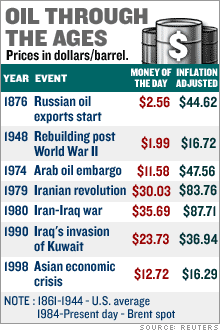Only Export Oil is Fungible
Posted by Glenn on April 18, 2006 - 12:00pm in The Oil Drum: Local
First, here's a look at some historical inflation adjusted oil prices that Reuters put together - I'm not sure of their methodology, but it looks about right.

But while oil is a world commodity, gasoline is not fungible due to issues with transportation and government intervention to either penalize or subsidize gasoline use. I thought it would be interesting to look at these differences in light of Westexas and Kebab's point about "Exportland" being more important than simple total world production levels.
Netherlands, Amsterdam $6.48
Norway, Oslo $6.27 [Major Oil Exporter]
Italy, Milan $5.96
Denmark, Copenhagen $5.93
Belgium, Brussels $5.91
Sweden, Stockholm $5.80
United, Kingdom London $5.79
Germany, Frankfurt $5.57
France, Paris $5.54
Portugal, Lisbon $5.35
Hungary Budapest $4.94
Luxembourg $4.82
Croatia Zagreb $4.81
Ireland Dublin $4.78
Switzerland Geneva $4.74
Spain Madrid $4.55
Japan Tokyo $4.24
Czech Republic Prague $4.19
Romania Bucharest $4.09
Andorra $4.08
Estonia Tallinn $3.62
Bulgaria Sofia $3.52
Brazil Brasilia $3.12
Cuba Havana $3.03
Taiwan Taipei $2.84
Lebanon Beirut $2.63
South Africa Johannesburg $2.62
Nicaragua Managua $2.61
Panama Panama City $2.19
Russia Moscow $2.10 [Major Oil Exporter]
Puerto Rico San Juan $1.74
Saudi Arabia Riyadh $0.91 [Major Oil Exporter]
Kuwait Kuwait City $0.78 [Major Oil Exporter]
Egypt Cairo $0.65
Nigeria Lagos $0.38 [Major Oil Exporter]
Venezuela Caracas $0.12 [Major Oil Exporter]
Clearly, the Major Oil Exporting nations (except for Norway)are subsidizing gasoline in a major way to meet domestic political pressures. And this is not a subsidy that costs hard currency since all they have to cover is the cost of lifting the oil out of the ground (Venezuela's 12 cents might not even cover that!), they are merely forgoing what they might have been able to sell on the open market. I suspect that the domestic political advantages of keeping gas prices low will continue to dwarf the potential gains from freeing up more of that for export.
This seems to be one of many important factors in explaining the current and future rise in world oil prices. As peak oil production capacity is reached and then begins to decline, oil exports will decline faster and domestic usage will not decline in exporting nations. In fact, domestic oil consumption might grow at first as the local economy becomes flush with cash from the oil they are exporting at ever increasing prices. Even regime change in these countries would probably not change this situation as no new government would want to change the status quo on gas prices and risk an internal revolt.
Nations like Indonesia and Malaysia that used to export oil and now have to import it moving forward will have to manage that transition carefully and make their markets more sensitive to the international price, lest they go bankrupt propping up gasoline consumption.
For oil importing nations, especially those with low gas taxes this should be a serious call to action to reign in oil consumption as much as possible through gasoline and diesel taxes to prepare for the coming export market crunch.



